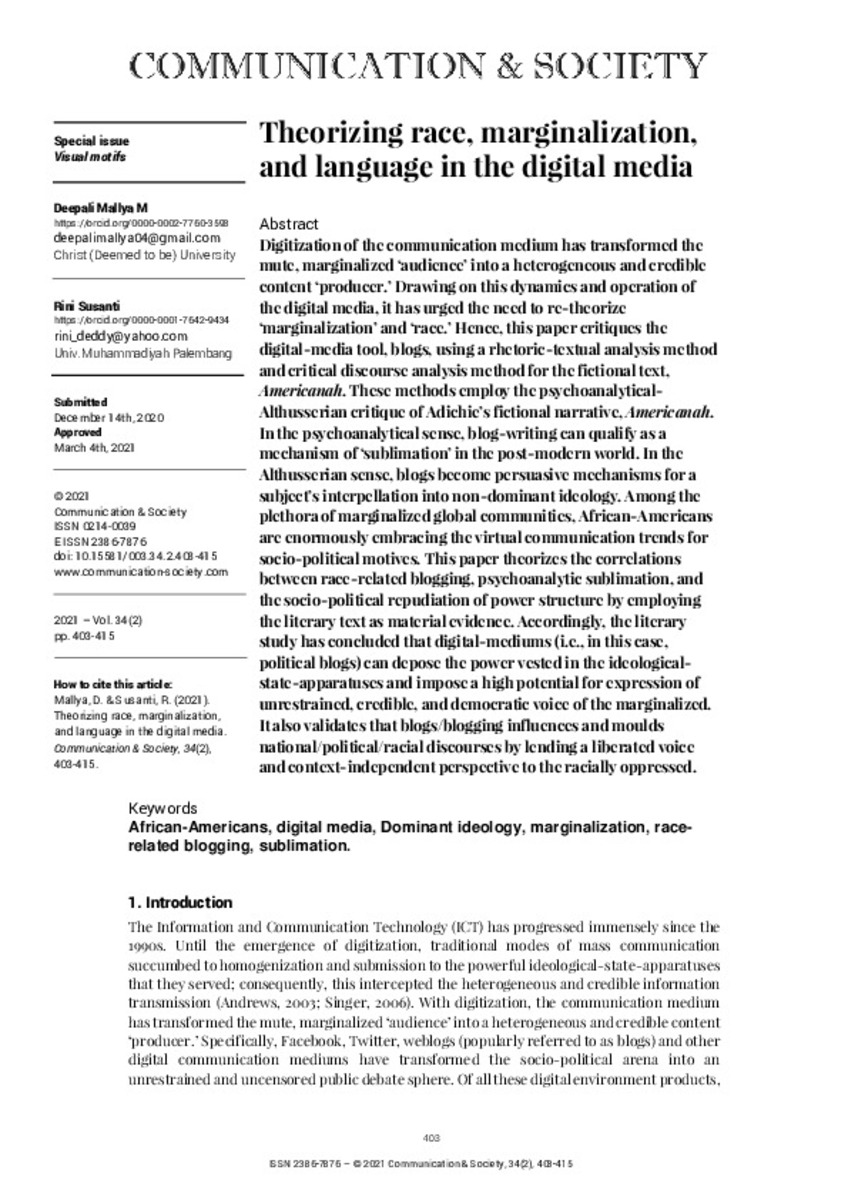Full metadata record
| DC Field | Value | Language |
|---|---|---|
| dc.creator | Mallya, D. (Deepali) | - |
| dc.creator | Susanti, R. (Rini) | - |
| dc.date.accessioned | 2021-04-13 | - |
| dc.date.accessioned | 2021-10-22T07:02:16Z | - |
| dc.date.available | 2021-10-22T07:02:16Z | - |
| dc.date.issued | 2021 | - |
| dc.identifier.citation | Mallya, D. (Deepali); Susanti, R. (Rini). "Theorizing race, marginalization, and language in the digital media". Communication & Society. 34 (2), 2021, 403 - 415 | es |
| dc.identifier.issn | 2386-7876 | - |
| dc.identifier.uri | https://hdl.handle.net/10171/62257 | - |
| dc.description.abstract | Digitization of the communication medium has transformed the mute, marginalized ‘audience’ into a heterogeneous and credible content ‘producer.’ Drawing on this dynamics and operation of the digital media, it has urged the need to re-theorize ‘marginalization’ and ‘race.’ Hence, this paper critiques the digital-media tool, blogs, using a rhetoric-textual analysis method and critical discourse analysis method for the fictional text, <em>Americanah</em>. These methods employ the psychoanalytical-Althusserian critique of Adichie’s fictional narrative, <em>Americanah</em>. In the psychoanalytical sense, blog-writing can qualify as a mechanism of ‘sublimation’ in the post-modern world. In the Althusserian sense, blogs become persuasive mechanisms for a subject’s interpellation into non-dominant ideology. Among the plethora of marginalized global communities, African-Americans are enormously embracing the virtual communication trends for socio-political motives. This paper theorizes the correlations between race-related blogging, psychoanalytic sublimation, and the socio-political repudiation of power structure by employing the literary text as material evidence. Accordingly, the literary study has concluded that digital-mediums (i.e., in this case, political blogs) can depose the power vested in the ideological-state-apparatuses and impose a high potential for expression of unrestrained, credible, and democratic voice of the marginalized. It also validates that blogs/blogging influences and moulds national/political/racial discourses by lending a liberated voice and context-independent perspective to the racially oppressed. | en_US |
| dc.language.iso | eng | - |
| dc.publisher | Servicio de Publicaciones de la Universidad de Navarra | es_ES |
| dc.rights | info:eu-repo/semantics/openAccess | es_ES |
| dc.title | Theorizing race, marginalization, and language in the digital media | en_US |
| dc.type | info:eu-repo/semantics/article | es_ES |
| dc.identifier.doi | 10.15581/003.34.2.403-415 | - |
| dadun.citation.endingPage | 415 | - |
| dadun.citation.number | 2 | - |
| dadun.citation.publicationName | Communication & Society | - |
| dadun.citation.startingPage | 403 | - |
| dadun.citation.volume | 34 | - |
Files in This Item:
Statistics and impact
Items in Dadun are protected by copyright, with all rights reserved, unless otherwise indicated.






